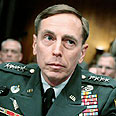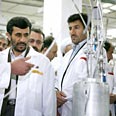

US General David Petraeus said on Tuesday Iranian efforts to develop a nuclear weapon appear to have been delayed "a bit" and voiced confidence it would not have a bomb this year.
The comments by the head of the US Central Command, which oversees wars in Iraq and Afghanistan, underscored the Obama administration's message to Israel and Gulf allies - that there is time to pressure Iran to abandon its nuclear weapons program by imposing more economic sanctions.
US President Barack Obama's top military advisers, including Defense Secretary Robert Gates and Admiral Mike Mullen, chairman of the Joint Chiefs of Staff, have been playing down the effectiveness of using military force against Iran.
"It has, thankfully, slid to the right a bit and it is not this calendar year, I don't think," Petraeus told a Senate panel when asked when Iran would have a nuclear weapon.
Iran denies it is seeking to build nuclear weapons.
Petraeus said while Obama had "explicitly stated that he has not taken the military option off the table," the administration's focus was on using different types of sanctions to get Tehran to change its behavior.
Petraeus has acknowledged that contingency planning was under way should Obama decide on military action but declined to discuss details during the open Senate hearing.
Last month, the US director of national intelligence, Dennis Blair, said Iranian advancements in enriching uranium and other areas showed the government was "technically capable" of producing enough highly enriched uranium for a weapon in the "next few years, if it chooses to do so."
Blair cited information published by the International Atomic Energy Agency showing that the number of centrifuges installed at Iran's enrichment plant at Natanz had grown to more than 8,000 from about 3,000 in late 2007.
But he said Iran appeared to be "experiencing some problems" at Natanz and was operating only about half of the installed centrifuges, constraining its overall ability to produce larger quantities of low-enriched uranium.
It was not immediately clear if Petraeus was referring to those problems.
While the nuclear program may have been slowed, Iran continues to expand the scale, reach and sophistication of its ballistic missile forces, US intelligence officials say.
'Regional security architecture'
To counter that threat, the United States has expanded land and sea-based missile defense systems in and around the Gulf. Petraeus said this "regional security architecture" included a network of shared early warning systems and ballistic missile defenses.
Some lawmakers point to signs that the Obama administration is moving to a containment strategy, rather than one aimed at denying Iran a nuclear weapon.
Petraeus declined to comment on what he termed a "big policy hypothetical."
He said current US policy was "very clear" in that "the president has said that Iran cannot have nuclear weapons."















